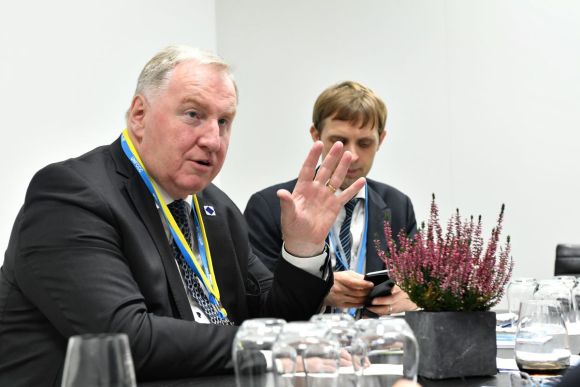
Interview with Karl-Heinz Lambertz, President of the CoR, European Committee of the Regions.
Mr. Lambertz, the integration of migrants into the labour market, as well as the topic of migration in general, many citizens in Europe consider more the central state respectively the respective national governments of the affected states to be obliged to solve these challenges. But shouldn't the issue of integrating migrants into the labour market be more in the hands of local and regional administrations?
"The questions raised by migration need to be addressed at all levels of political decision-making. There are three levels of action: that of the countries of origin where its people come from and where the reasons of migration must be combated.
Then there is the problem of external borders, which is less a problem of figures than is often assumed. The mere reference to Dublin has ruined a lot, and it is a great failure that no adapted new rules have yet been agreed.
And then comes the real challenge, namely integration at various levels, in society, in employment and in language and culture, and that is where the local and regional authorities are called upon. And on the specific questions relating to housing and employment, it is a question of how each country is organized and who is responsible.
It is usually the local authorities that are called upon to do this, but they must not be left to their own devices and need to be supported by the various levels of government, but also by Europe, for it is precisely now, when the Union's financial strategies are being reoriented over the next seven years, that it is important to give this issue of the integration of migrants sufficient space."
Do smaller rural regions perform more successfully than larger metropolitan regions in integrating migrants, because these smaller regions are closer to reality?
"The closeness to reality is present in all local authorities, even in the larger ones, but there are different problems in a more urbanized region than in more rural regions. The willingness to take in strangers, often we are not only dealing with objective facts here, but very often in priority with emotional feelings.
It is very impressive to see that xenophobia is often widespread where there are few foreigners. But it can also develop where integration fails. None of this is so easy, and you can't solve these things with a few nice words. Successful integration is a really difficult task, which you have to do with expertise, commitment and foresight and where you should "promote and demand".
The successful examples of our platform that we in the Committee of the Regions created at the beginning of this year are those where good integration has succeeded. In the city of Mechelen, where the mayor Bart Sommers has become famous for his successful integration concepts, there are more foreigners than in the whole Hungarian Republic. There in Mechelen we can show successful results. Why? Because they have really taken care of it, because they have taken the subject seriously and have not allowed it to go ahead, and because they also set clear conditions.
Integration succeeds where it is possible to bring the local population into contact with newcomers in such a way that they approach each other and where they can install rules to life better together, and this must be accompanied by the political hand.
Of course, the issue of illegal immigration and people whose residence permit has been rejected, remains a very difficult topic. This is a tricky issue with difficult legal and humanitarian aspects. In principle, those who are not granted the right of residence must return, but it is not possible to send people back everywhere.
One has to learn to deal with this and in the last 15 years there has been a paradigm shift in this area. It is about values, about convictions that are not necessarily compatible with all, and I can personally confirm this with my visits to the regions.
I have precise convictions of my own, which I also think are right, but I must also accept that other ideas exist. And if you want to change things, then you also have to understand the motivation of the other side and explore similarities in solving the problems."
What role must the Committee of the Regions continue to play in the future when it comes to the issue of migration and what challenges need to be resolved in the near future?
"The Committee of the Regions is concerned to give greater weight to the role of local and regional authorities in this system. Furthermore, given the many problems we have in the area of integration, it is our task to ensure that exchanges take place and that the European framework conditions are properly developed. We are currently discussing the one issue where friendship usually ends more often, namely the distribution of money. We have to look at what is available for the individual areas and what has given them a certain status.
Our alliance will continue to be very active in this. The alliance for cohesion."
Interview realized by Alexandre Kintzinger (Luxembourg)



